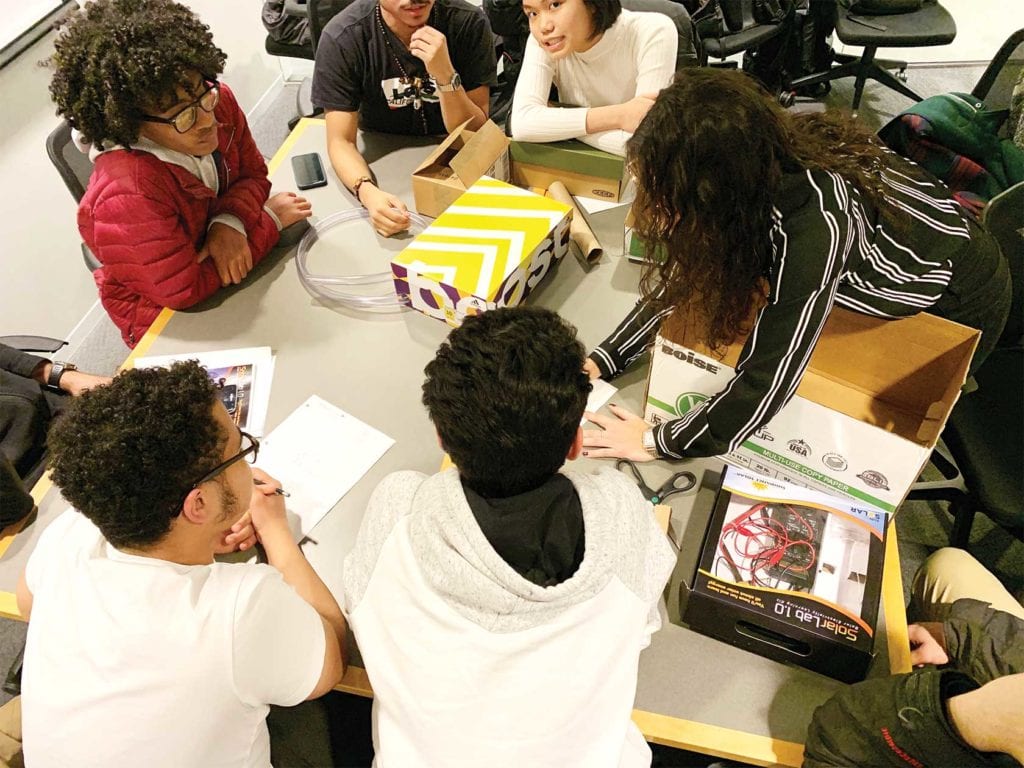
Like many schools and extracurricular programs reorienting during the pandemic, the ACE Mentor Program of Greater Boston is grappling with the big question: How do you create an engaging online learning program?
This question is particularly challenging for an after-school program focused on building hands-on skills in technical fields like the architecture, construction and engineering (ACE) industry. But Jen Fries, the new executive director at ACE Mentor Program of Greater Boston, has a plan for turning the program into an engaging virtual learning experience.
“We all got together, masked and safe, to create kits for students,” Fries said, referring to her volunteer team. “And we overnighted kits to students that just signed up.”
These kits include mechanical pencils with various lead sizes for particular architectural and engineering sketch techniques, a sketchbook, Legos, and mini marshmallows and toothpicks for an upcoming model-building project. In addition, Holly Ganser, ACE’s student coordinator, has checked in with students about their internet and computer access.
“We are willing and ready to do what’s necessary to make sure everyone can access the program,” Fries said.
Pre-COVID-19, students in grades 9–12 in the ACE program would meet with industry mentors twice a week in groups of around 30 students, each with 15 mentors. Each group would meet at a university or architecture firm to work on projects such as designing an apartment building. The program is offered to students free of charge.
Fries plans to keep this project-based curriculum and modify it for virtual learning. The students will instead work on a smaller residential design and will only meet once a week for an hour to combat Zoom fatigue.
“One of the really big concerns is the mentoring component,” said Alison Stanton, who founded the Greater Boston chapter of the ACE Mentor Program. “It is really hard to mentor over Zoom, and mentoring really happens before and after the sessions, when you’re just talking and giving advice, so that’s one of our biggest concerns, how to continue that mentor support.”
She said Fries and the ACE team are working on providing opportunities for mentor-mentee bonding.
“We’ll do breakout rooms and schedule one-on-one time, and hopefully we’ll say in a few months, ‘We were worried before but now we’re in a good place,’” said Stanton.
Stanton was inspired to start a Greater Boston chapter of the national organization through her community and citizenship work for Turner Construction Company.
“One of my priorities is getting out into schools to ensure young people are aware of the job opportunities that exist in the industry,” said Stanton. “I focus on growing diversity, among women and POC specifically, and was told about the ACE program and encouraged to get a chapter started in the Boston area.”
As the program moves online this year, ACE of Greater Boston is concerned with maintaining that original purpose of the program — introducing students to the industry who otherwise would not have the chance.
“We wanted to be deliberate about making sure the program reached the students it always has, students who otherwise would not have the opportunity to enter the field,” said Fries. “Whether it’s lack of family connections, racism, immigrant, gender, et cetera, we wanted to make sure they still had access. We were worried we might serve upper-income kids, because their parents would be looking for things for them to do to enrich their learning.”
With this in mind, the ACE team asked alumni to tell their friends and family about the program and signed up for a texting service that allows mentors and ACE volunteers to safely communicate with students. They texted hundreds of students to encourage them to return to the program or to spread the word to friends and family.
So far, it seems to have worked. More than 160 students have signed up, with more still rolling in just days before the program began last Monday.
Libby Wright, a junior at the Academy of the Pacific Rim who began the ACE program her freshman year, is excited to be back.
“It’s pretty good, for being online,” Wright said. “I know it’s hard when you have 50 students and new mentors. The kits were great.”
Wright said she joined ACE after seeing a flyer for the program at her school and then hearing about it again when two ACE representatives came to talk about the program during her lunch period.
“I was in a mechanical and electrical engineering and plumbing (MEP) group and learned how to build a building, and how to be efficient — which I definitely didn’t expect to get out of an after-school program.”
Looking ahead, Wright is now thinking of pursuing MEP after high school graduation. When she does, she’ll have access to a $10,000 to $15,000 scholarship from ACE.
Alejandrina Estrada, a junior at the John D. O’Bryant School of Mathematics and Science, says her plans for the future have also been affected by the industries she has been able to explore through ACE.
“Before ACE, my main thought was to go to college right after high school and do something like engineering,” Estrada said. “But I didn’t know many branches of engineering and was thinking generally. It wasn’t until I did ACE, and the mentors started talking about their professions, that I started getting into the trade. So now I’m thinking a little of both, I’m thinking about college and trade now.”
And that, ultimately, is the reason Alison Stanton founded ACE of Greater Boston in the first place.
“I started in construction back in 2000 and there were not many women and POC in the industry,” said Stanton. “We’ve seen some of those numbers grow, but we need programs like ACE to spread the awareness of the many career opportunities within the field. So the earlier we can get into schools and educate students, the better.”









